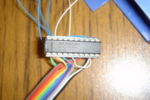Difference between revisions of "MAX233A"
(Moved data from 'Chips' page) |
|||
| Line 3: | Line 3: | ||
Because the power needed to send digital signals through the router is much less than the standard RS232 power levels, we need a way of ramping up the voltage enough for signals to be correctly detected by serial hardware on the other end of the cable we connect. In the same way, we need to make sure that the ~5V signals coming as input from another machine do not fry the internal circuitry of the router. The obvious solution for this problem would be a transformer, but there exists another, much cooler way: the MAX233A. It requires no extra parts or special power source, but it correctly changes the voltages so everything works properly. (See [1] for more information on the MAX233A.) | Because the power needed to send digital signals through the router is much less than the standard RS232 power levels, we need a way of ramping up the voltage enough for signals to be correctly detected by serial hardware on the other end of the cable we connect. In the same way, we need to make sure that the ~5V signals coming as input from another machine do not fry the internal circuitry of the router. The obvious solution for this problem would be a transformer, but there exists another, much cooler way: the MAX233A. It requires no extra parts or special power source, but it correctly changes the voltages so everything works properly. (See [1] for more information on the MAX233A.) | ||
| + | == References == | ||
[1] http://www.compsys1.com/workbench/On_top_of_the_Bench/Max233_Adapter/max233_adapter.html | [1] http://www.compsys1.com/workbench/On_top_of_the_Bench/Max233_Adapter/max233_adapter.html | ||
| + | |||
| + | == See Also == | ||
| + | *[[National Semiconductor 16550 UART]] | ||
Latest revision as of 20:40, 11 July 2007
Max 233A Transceiver
Because the power needed to send digital signals through the router is much less than the standard RS232 power levels, we need a way of ramping up the voltage enough for signals to be correctly detected by serial hardware on the other end of the cable we connect. In the same way, we need to make sure that the ~5V signals coming as input from another machine do not fry the internal circuitry of the router. The obvious solution for this problem would be a transformer, but there exists another, much cooler way: the MAX233A. It requires no extra parts or special power source, but it correctly changes the voltages so everything works properly. (See [1] for more information on the MAX233A.)
References
[1] http://www.compsys1.com/workbench/On_top_of_the_Bench/Max233_Adapter/max233_adapter.html
